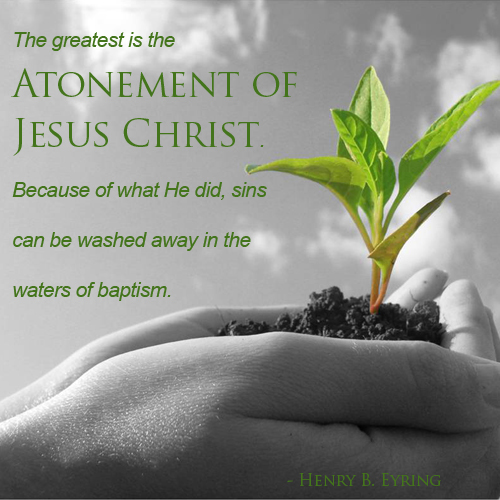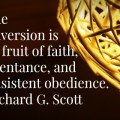In Alma chapter 5, Alma is entering into his last decade of church service. He has given up the judgment seat so he can confine all his energies to preaching the word of God. The sermon we will look at today challenges the belief of the members of the church. Alma wants them to “get real” with themselves and look at their personal state of worthiness before the Lord.
The purpose of Alma’s sermon is to help the members of the church desire to have the change of heart that comes with conversion. He understands that conversion is rarely a one day process, like it was for him. For most of us it is a gradual change that takes years, even decades, to complete.
In verse 14 Alma asks the Saints some qualifying questions to get them thinking about the subject.
14 And now behold, I ask of you, my brethren of the church, have ye spiritually been born of God? Have ye received His image in your countenances? Have ye experienced this mighty change in your hearts?
To be spiritually born of God is usually referred to as being converted. Have you personally had a conversion experience? By a conversion experience I don’t mean an Alma the Younger experience. Most of us have small conversion experiences. Have you had a witness of the truthfulness of the Book of Mormon? What about coming to know that the Law of Tithing is a law from God? These are both conversion experiences. We also need to have experiences related to knowing that the living prophet is indeed a prophet, seer, and revelator, that the Word of Wisdom is a correct principle and commandment, etc.
Conversion experiences should be ongoing throughout our lives. But Alma’s question is basic. Have you had ONE of them yet?
Next he wants to know if we have received Christ’s image in our countenance yet. When someone looks at your face do they think, “Wow! That person has a glow about them. They look happy, hopeful, and at peace.” Or do they look at your face and want to hide their children from you?
When we have Christ’s image “engraven” in our countenance, we radiate the joy of gospel living. The gloom and doom of the hopeless masses should not be reflected in our faces. Righteous living produces peace, and serenity can be visibly seen in a person’s face.
Verse 15 prepares the people to hear the scenarios Alma will be presenting to them. He is now asking each person to see themselves in relation to the judgment that will come to all of us. Are we exercising faith in the atonement of Christ? In other words, have you been repenting and seeking forgiveness? Are you looking forward to the day when, because of your righteous living, you can see yourself raised or resurrected to stand before God and personally face Him with an account of your life in mortality?
15 Do ye exercise faith in the redemption of Him who created you? Do you look forward with an eye of faith, and view this mortal body raised in immortality, and this corruption raised in incorruption, to stand before God to be judged according to the deeds which have been done in the mortal body?
Scenario 1
The first scenario assumes we have been righteous, have repented, received forgiveness for our sins, and have lived good lives, filled with service, having shown good will towards all.
16 I say unto you, can you imagine to yourselves that ye hear the voice of the Lord, saying unto you, in that day: Come unto me ye blessed, for behold, your works have been the works of righteousness upon the face of the earth?
Scenario 2
In the next scenario Alma challenges our delusions. So often we pretend to ourselves that we can break commandments, but somehow it will all be glossed over when it comes time to actually have to be accountable for our time in mortality.
17 Or do ye imagine to yourselves that ye can lie unto the Lord in that day, and say—Lord, our works have been righteous works upon the face of the earth—and that He will save you?
Do we honestly believe we can put off the requirements of our covenants and not be held accountable for having broken those covenants more often than we have kept them? This question begs some personal contemplation.
Scenario 3
The last scenario is one of no excuses. Do we recognize and acknowledge to ourselves that we have put off being obedient? We haven’t made the personal changes required for us to become more Christlike. Nor have we in mortality been diligent in keeping the commandments.
18 Or otherwise, can ye imagine yourselves brought before the tribunal of God with your souls filled with guilt and remorse, having a remembrance of all your guilt, yea, a perfect remembrance of all your wickedness, yea, a remembrance that ye have set at defiance the commandments of God?
This is a harsh reality indeed. We know what is right and what is wrong. If we are being honest with ourselves can we admit it when we have deliberately chosen to ignore the commandments of God because we wanted to indulge ourselves in the habits of the world?
It is important to remember that at that day there will be no hiding. All of the truth of our beliefs and behavior will be displayed in all its splendor or in all its shame. This is why those who have deliberately sought to be disobedient in the days of their probation will be filled with guilt and remorse. They will see all their sins displayed for all to witness, and will no longer be able to hide their perversions and wicked ways.
The comparison
In that day we will have everything exposed, both the good of our lives and the bad. Nothing will be hidden from view. Those who have been placed over us in positions of authority, like our living prophets and others will be there to witness for us or against us. Will we be able to look up to our God with a pure heart and clean hands or will we see, as everyone else does, that we have yielded ourselves to Satan and his devils here in mortality?
19 I say unto you, can ye look up to God at that day with a pure heart and clean hands? I say unto you, can you look up, having the image of God engraven upon your countenances?
20 I say unto you, can ye think of being saved when you have yielded yourselves to become subjects to the devil?
The point of the sermon
Alma is hoping to get the members of the church to see that in that day all excuses will be taken away. We will all be able to see as we are seen, and we will know as we are known by God. That will either be a great blessing to us or a heavy sorrow.
21 I say unto you, ye will know at that day that ye cannot be saved; for there can no man be saved except his garments are washed white; yea, his garments must be purified until they are cleansed from all stain, through the blood of Him of whom it has been spoken by our fathers, who should come to redeem His people from their sins.
Final Thoughts
Alma’s final point is this. Salvation comes only in and through Christ. He, and only He can redeem us. Are we being honest with ourselves each day? Salvation doesn’t happen by accident. We can’t say to ourselves that if we wander through life, but never commit any atrocity, that this will be enough to be saved.
The Lord wants us to look forward to that day when we will have to stand before Him and be held accountable. How we live our life from moment to moment and from day to day makes a difference. Each day we need to be aware that our time here is short, and no one knows when we will be called out of this world. Do we really want to bet that we can do as we please and get away with being disobedient, and someday we will get around to repenting?
Our lives can be joyful in the here and now. If we will live each day, looking forward to that day when we will be able to stand before our Savior and be clean and pure; then our time here each day will be filled with good deeds, earnest prayers, faithful obedience, and grateful hearts. Life may not be easy by any standard, but it is still possible to have a happy life if we are willing to be honest with ourselves.
About Kelly P. Merrill
Kelly Merrill is semi retired and writes for https://gospelstudy.us. He lives with his wife in Idaho. His strength is being able to take difficult to understand subjects and break them down into understandable parts. He delights in writing about the gospel of Christ. Writing about the gospel is his personal missionary work to the members of the Church and to those of other faiths who are wanting to know more about Christ's gospel and His Church.







